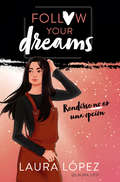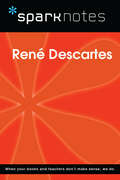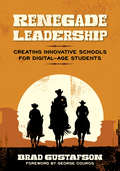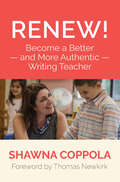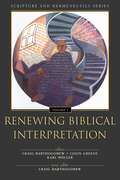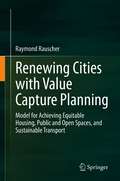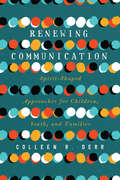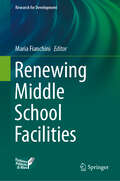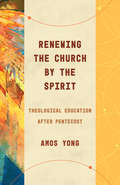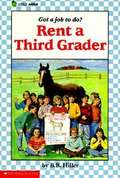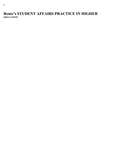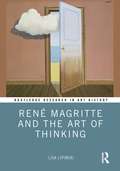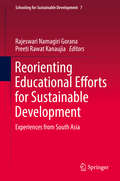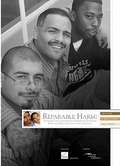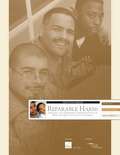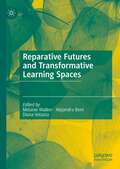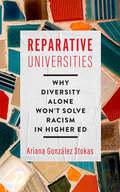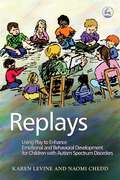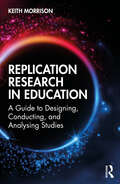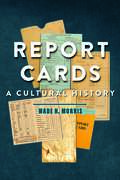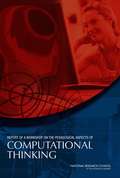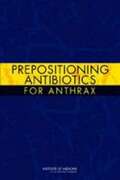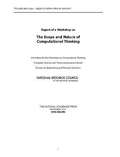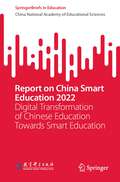- Table View
- List View
Rendirse no es una opción (Follow your dreams #Volumen 1)
by Laura López¡El primer libro de Laura López, la estrella de Musical.ly! Laura tiene dieciséis años, va al instituto y tiene su grupo de amigos. Hasta aquí todo es normal, ¿verdad? Lo que no es tan normal es que ¡Laura tiene más de un millón de seguidores en Musical.ly! Por si eso fuera poco, junto con sus amigos participará en un concurso para bailar en el próximo videoclip de «The Rocks». ¡Y además es en Londres! ¡Aaah! ¿Conseguirán brillar por encima de los demás grupos?
Rene Descartes (SparkNotes Philosophy Guide)
by SparkNotesRene Descartes (SparkNotes Philosophy Guide) Making the reading experience fun! SparkNotes Philosophy Guides are one-stop guides to the great works of philosophy–masterpieces that stand at the foundations of Western thought. Inside each Philosophy Guide you&’ll find insightful overviews of great philosophical works of the Western world.
Renegade Leadership: Creating Innovative Schools for Digital-Age Students
by Brad R. GustafsonGet ready to be a renegade with this how-to leadership guide. We’re all looking for the next best tech tool, but why don’t we have the same progressive appetite for pedagogy that we have for technology? Renegade leadership may be the answer we need. Merging best practice with innovation, renegade leadership is student-centered, intertwining equity, culture, and technology. Using research, vignettes, and renegade profiles, this book challenges you to lead in the digital age by: Applying transformational tenets of connected pedagogy Increasing your leadership in curriculum, cultural proficiency, and school improvement Leading staff meetings, planning professional development, and improving student learning Don’t miss the free podcasts, flipped book study, and more on the Renegade Leadership website.
Renegade Leadership: Creating Innovative Schools for Digital-Age Students
by Brad R. GustafsonGet ready to be a renegade with this how-to leadership guide. We’re all looking for the next best tech tool, but why don’t we have the same progressive appetite for pedagogy that we have for technology? Renegade leadership may be the answer we need. Merging best practice with innovation, renegade leadership is student-centered, intertwining equity, culture, and technology. Using research, vignettes, and renegade profiles, this book challenges you to lead in the digital age by: Applying transformational tenets of connected pedagogy Increasing your leadership in curriculum, cultural proficiency, and school improvement Leading staff meetings, planning professional development, and improving student learning Don’t miss the free podcasts, flipped book study, and more on the Renegade Leadership website.
Renew!: Become a Better and More Authentic Writing Teacher
by Shawna CoppolaWhen was the last time you shook up your writing instruction? In Renew!: Become a Better and More Authentic Writing Teacher, author Shawna Coppola builds on the premise that our students are ever-changing, and so is our collective knowledge base. Instructional strategies that have worked in the past may need to evolve accordingly. Coppola guides K-8 writing teachers with a three-part framework for Rethinking, Revising, and Renewing their approach'sand finding new energy along the way. Using the framework, Renew! examines the most pervasive educational practices in writing instruction and poses questions that guide teachers to revise those practices to ensure they are effective for all students. Coppola believes the work is challenging, yet critical, referencing R. Buckminster Fuller's Knowledge Doubling Curve: According to Fuller's paradigm, the amount of time it takes for us to increase our collective knowledge base by 100 percent will continue to shrink the older we get. If this is true'sor even close to being true'show can we, as educators, ever feel satisfied with teaching our students the same concepts, using the same methodologies and practices, that we have in the past? The book offers a road map for renewing key aspects of our practice, including: How we teach the writing process: Over time and frequent usage, some of our favorite teaching strategies can become rigid. Coppola gives a candid account of how her enthusiasm for the writing process as an undergraduate led her to teach writing for years as a set of pre-determined steps. Now she teaches that there are many variations of the writing process, and many twists and turns along the path. One foundational strategy used is opening up her own process as a writer'sand her writer's notebook'sto students and encouraging them to think and talk about their process with classmates. What we mean by Writing: Coppola argues that drawing isn't an accompaniment to writing; it is writing. Its another form of composition through which students can tell stories, convey ideas, and engage readers. The book is full of visual compositions by students as well as Shawna's wonderfully simple and evocative sketches from her writer's notebook. The tools we use to teach writing: The most ubiquitous tools used to teach writing'sfrom anchor charts to graphic organizers to sentence starters etc.'stend to be teacher-centric rather than student-centric. Renew! invites students into the process of constructing tools that are meaningful and helpful to them. The book includes a range of examples of tools built collaboratively with students. How we assess and evaluate student writing: Coppola draws a distinction between assessment'swhich should be an interactive conversation with students'sand evaluation, which is about judging and categorizing what students know and can do. Renew! offers a range of examples and resources that illustrate effective feedback for student writers, including online videos of teacher-student and peer-to-peer conferences. Renew! also offers ideas for how teachers can nurture their own writing lives and thus reinvigorate their instructional practice. Through rethinking, revising, and renewing their practice, teachers can not only strengthen students' skills as writers, but also nurture students to become critical thinkers, problem solvers, and risk takers in the classroom and in our rapidly-changing world.
Renewing Biblical Interpretation (Scripture and Hermeneutics Series)
by ZondervanRenewing Biblical Interpretation is the first of eight volumes from the Scripture and Hermeneutics Seminar. This annual gathering of Christian scholars from various disciplines was established in 1998 and aims to re-assess the discipline of biblical studies from the foundation up and forge creative new ways for re-opening the Bible in our cultures. Including a retrospective on the consultation by Walter Brueggemann, the contributors to Renewing Biblical Interpretation consider three elements in approaching the Bible—the historical, the literary and the theological—and the underlying philosophical issues that shape the way we think about literature and history.
Renewing Cities with Value Capture Planning: Model for Achieving Equitable Housing, Public and Open Spaces, and Sustainable Transport
by Raymond RauscherThe book offers a model for city development and renewal based on land value capture (called ‘value capture’). Firstly, a review is presented of cities around the world that are currently using value capture. From these city examples the author shows how any state, city or regional government can adopt value capture policies. Looking at recent events the author reviews the implications of the coronavirus pandemic (2020) for future planning (including value capture) of cities and regions (particularly noting healthy cities planning). The development of a value capture planning (VCP) model is then outlined. The basis of the model is reflected in its planning components, being: Housing (affordable, social and market housing); Public and Open Spaces (natural areas, open spaces and public spaces); and, Sustainable Transport (rail, bus, and active transport). The VCP model is devised to provide an economic and planning tool that can be utilised in addressing each of these planning components. This tool includes data entry tables and explanations of how these tables are applied. Four case study cities (within Australia) currently undergoing renewal are selected for the model to be applied to. The areas were chosen to represent contrasting urban settings and types of development and renewal, including: inner city, middle ring city; growth centre city; and, regional capital city. The current (2020) active renewal programs within these areas include (city in brackets): Central to Eveleigh Renewal Area (CERA) (City of Sydney); Sydenham to Bankstown Urban Renewal Corridor (SBURC) (Canterbury Bankstown City); Gosford City Centre Revitalisation (GCCR) area (Gosford City); and, Newcastle City Renewal Area (NCRA) (Newcastle City). The reader is walked through (graphically) the backgrounds of these case study cities, including geography, development trends and details of renewal plans. Conclusions on the VCP model application are outlined for each study area (within that chapter) and for the cumulative results across all study areas (final chapter). With these conclusions, the application of the model to any city or region anywhere in the world is outlined. Finally, on a practical level the reader would be interested in how value capture is administered through programs (including the roles of government, developers and the community). Summing up, the book offers the reader an understanding of current city planning and the tools (like value capture) that will be required for future planning.
Renewing Communication: Spirit-Shaped Approaches for Children, Youth, and Families
by Colleen R. DerrWe are constantly communicating.Renewing Communicationtheories of human developmenthow to understand your audience and contextsetting specific goalsnonverbal communicationeffective techniquesusing creativityevaluation and assessment
Renewing Middle School Facilities (Research for Development)
by Maria FianchiniThis book draws on important original transdisciplinary research to address a wide range of issues relating to the remodeling of existing schools for pre-teenagers to fit them to various novel teaching models (e.g. collaborative learning, ICT integration, and out-of-classroom working) and to create effective educational environments for the future.The strong relationship between people’s wellbeing, physical environment and student learning in schools has already been extensively studied in international research. At the same time, a number of different scenarios of possible innovations are now emerging, and these require conscious choices in terms of designing both the ways and the places where educational processes can be developed.The principal focus of this research was the relationship between infrastructure, activities, and school communities.The book is divided into three sections, the first of which discusses conceptual aspects and outlines innovative renewal strategies. The second section describes a participatory research process developed in five case studies of lower-secondary or middle schools with the aim of updating our knowledge about such schools and identifying emerging issues. The last section presents case studies, operational tools, and design strategies that aid decision-making and support interventions to renew school facilities. The book is intended mainly for scholars of architecture and education, but is also of interest to a wider readership, including principals, teachers, designers, decision-makers in school communities, and heads of municipal education departments.
Renewing the Church by the Spirit: Theological Education after Pentecost (Theological Education between the Times)
by Amos YongIn most parts of the world and especially where Christianity is flourishing, Pentecostal and charismatic movements predominate. What would it look like for the Western world—beset by the narrative of decline—to participate in this global Spirit-driven movement? According to Amos Yong, it all needs to start with the way we approach theological education. Renewing the Church by the Spirit makes the case for elevating pneumatology in Christian life, allowing the Spirit to reinvigorate church and mission. Yong shows how this approach would attend to both the rapidly deinstitutionalizing forms of twenty-first-century Christianity and the pressing need for authentic spiritual experiences that marks contemporary religious life. He begins with a broad assessment of our postmodern, post-Enlightenment, post-Christendom ecclesial context, before moving into a detailed outline of how a Spirit-filled approach to theological education—its curriculum, pedagogy, and scholarship—can meet the ecclesial and missional demands of this new age.
Rent a Third Grader
by B. B. HillerEveryone in Miss Bilgore's third grade class loves Partner, a retired police horse. But it looks like Partner is headed for a terrible fate--pet food! Then the kids get an idea: each third grader will find odd jobs and earn money to pay for Partner's care.
Rentz's Student Affairs Practice in Higher Education
by Naijian ZhangThe landscape of student affairs in American higher education has increasingly become multidimensional due to more diversity of student population and more complex issues students bring to campus. <p><p>This new fifth edition is designed to equip student affairs professionals to understand and know well not only the philosophy, history, mission of student affairs, and that their practice is theory based and outcome oriented but also that their role and function are influenced by the shifts in philosophy, mission and strategies, theories, and nature of American higher education. With most chapters substantially rewritten, this edition has included three brand new chapters which cover functional areas of fraternity and sorority life, collegiate recreation, and assessment and student learning.
René Magritte and the Art of Thinking (Routledge Research in Art History)
by Lisa LipinskiFor René Magritte, painting was a form of thinking. Through paintings of ordinary objects rendered with illusionism, Magritte probed the limits of our perception—what we see and cannot see, the nature of representation—as a philosophical system for presenting ideas, and explored perspective as a method of visual argumentation. This book makes the claim that Magritte’s painting is about vision and the act of viewing, of perception itself, and the process of how we see and experience things in the world, including paintings as things.
Reorienting Educational Efforts for Sustainable Development
by Rajeswari Namagiri Namagiri Gorana Preeti Rawat Rawat KanaujiaEducation in South Asia has a renewed agenda which can enable societies to leapfrog development that is sustainable such that the individual is prepared for his/her involvement, responsibility and commitment to local and global discussions of our common future. This book on South Asia will focus on initiatives under the Education for Sustainable Development (ESD) umbrella and discuss the challenges, opportunities, issues and strategies in the countries of the region. It presents these initiatives of Environmental Education/ESD vis-à-vis the administrative, economic, social, cultural and ecological realities of each country at various levels of policy, planning, implementation and evaluation. The discussions in this book extend beyond formal education systems like schools, higher education, pre-service and in-service teacher preparation to community education and education initiatives conceptualized with the goal of sustainability. All initiatives will demonstrate how each country in its own pace contributing to move ESD from the periphery to the core of education initiatives.
Reparable Harm
by Lois M Davis Dana Scultz M. Rebecca KilburnThe Los Angeles area has the most severe traffic congestion in the United States. Trends in many of the underlying causal factors suggest that congestion will continue to worsen in the coming years, absent significant policy intervention. Excessive traffic congestion detracts from quality of life, is economically wasteful and environmentally damaging, and exacerbates social-justice concerns. Finding efficient and equitable strategies for mitigating congestion will therefore serve many social goals. The authors recommend strategies for reducing congestion in Los Angeles County that could be implemented and produce significant improvements within about five years. To manage peak-hour auto travel, raise transportation revenue, improve alternative transportation options, and use existing capacity more efficiently, they recommend 10 primary strategies: improve signal control and timing; restrict curb parking on busy thoroughfares; implement paired one-way streets; promote ride-sharing, telecommuting, and flexible work schedules; develop a high-occupancy toll-lane network; vary curb-parking rates with demand, enforce the current parking cash-out law; promote deep-discount transit passes; expand bus rapid transit and bus-only lanes; and implement a regionally connected bicycle network. In addition, three recommendations may help, depending on the outcome of current events: evaluate arterial incident management, consider cordon congestion tolls, and levy local fuel taxes to raise transit revenue. Given that some of the recommendations may prove controversial, the authors also outline complementary strategies for building political consensus.
Reparable Harm: Executive Summary
by Lois M. Davis M. Rebecca Kilburn Dana SchultzThe summary discusses some of the greatest disparities for boys and men of color relative to their white counterparts across specific socioeconomic, health, safety, and school readiness indicators in California and provides information about different strategies for reducing the disparities--including effective programs, practices, and policies--that can begin making an important difference in changing the life course of boys and men of color.
Reparative Futures and Transformative Learning Spaces
by Melanie Walker Alejandra Boni Diana VelascoThis edited book draws on an international cohort of authors, all working towards sustainable, decolonizing human development for more just futures in a variety of learning spaces. Integrating sustainable human development with ‘reparative futures’, the chapters present diverse examples of how transformative learning spaces can be created through different participatory methodologies and with different stakeholders. The book will be of interest to researchers, graduate students, practitioners and policymakers in the areas of higher education, development studies and transformative innovation.
Reparative Universities: Why Diversity Alone Won't Solve Racism in Higher Ed (Critical University Studies)
by Ariana González StokasA timely investigation of why diversity alone is insufficient in higher education and how universities can use reparative actions to become anti-racist institutions.As institutions increasingly reckon with histories entangled with slavery and Indigenous dispossession, diversity, equity, and inclusion (DEI) efforts occupy a central role in the strategy and resources of higher education. Yet reparation is rarely offered as a viable strategy for institutional transformation. In Reparative Universities, Ariana González Stokas undertakes a critical and decolonial analysis of DEI work, linking contemporary practices of diversity to longer colonial histories. González Stokas argues that diversity is an insufficient concept for efforts concerned with anti-oppression, anti-racism, equity, and decolonization. Given its historical ties to colonialism, can higher education foster reconciliation and healing?Reparation is offered as a pathway toward untangling higher education from its colonial roots. González Stokas develops the term "epistemic reparation" to describe a mode of social-historical accountability that can already be seen at work in historical examples, as well as current events in the United States, South Africa, and Canada. Recent legal decisions by Georgetown University and the Princeton Theological seminary to enact economic recompense for buying and selling human beings are evidence of attempts to redress higher education's violent histories and the colonial structures they reproduce every day on college campuses. Engaging with a broad range of theories from decolonial philosophy to organizational psychology, González Stokas offers a pathway—guided by reparative activities—for institutional workers frustrated by what often feels, as Sara Ahmed describes, like "banging one's head against a brick wall." Reparative Universities offers insight into why DEI efforts have been disconnected from past injustices and why unsettling diversity and engaging meaningful repair are critical for the future of higher education.
Replays: Using Play to Enhance Emotional and Behavioural Development for Children with Autism Spectrum Disorders
by Karen Levine Naomi CheddReplays addresses the challenging behaviors of children with autism spectrum disorders through interactive symbolic play. It shows parents and professionals how to help children access their emotions, whether the child is verbal or not, cognitively able or impaired, even-tempered or volatile. The chapters introduce and show readers how to implement Replays, and describe ways of adapting this intervention to address specific issues in different settings and circumstances. Levine and Chedd present more than just behavioral management strategies in the context of social, emotional and communication development: they have developed a technique that helps children to re-experience, play through and master the complex emotional response states that often lead to ongoing behavioral challenges. Replays is an easy and fun tool that provides numerous step-by-step examples and illustrations. It enables parents and professionals to guide children with autism spectrum disorders towards mastering, and changing, their emotional and behavioral responses.
Replication Research in Education: A Guide to Designing, Conducting, and Analysing Studies
by Keith MorrisonProviding an overview of key issues in theory and practice, Replication Research in Education is designed to identify and discuss the benefits and challenges facing replication studies in education. Both clear and practical, this groundbreaking volume covers how to introduce, develop, conduct, report, and discuss these studies, and the issues they raise for policy and practice. Bridging theory and practice, this book considers what replication research should look like, how it should be conducted, and how to judge when it has been successful. It enables researchers to plan and conduct studies successfully, from their earliest stages through to completion. This key text: brings together in a single volume, existing issues, claims and counterclaims, discourses, and practices of replication; introduces, covers, and extends this field of research, indicating its possibilities and limits; expands and adds to existing discussions and practices; will enable researchers to design, conduct, evaluate, and critique studies. The comprehensive and exhaustive coverage of issues and practices within Replication Research in Education make it a 'must read' for all novice and experienced educational researchers who are considering, conducting, and reviewing replication studies in education.
Report of a Workshop of Pedagogical Aspects of Computational Thinking
by The National Academy of SciencesIn 2008, the Computer and Information Science and Engineering Directorate of the National Science Foundation asked the National Research Council (NRC) to conduct two workshops to explore the nature of computational thinking and its cognitive and educational implications. The first workshop focused on the scope and nature of computational thinking and on articulating what "computational thinking for everyone" might mean. A report of that workshop was released in January 2010. Drawing in part on the proceedings of that workshop, Report of a Workshop of Pedagogical Aspects of Computational Thinking, summarizes the second workshop, which was held February 4-5, 2010, in Washington, D. C. , and focuses on pedagogical considerations for computational thinking. This workshop was structured to gather pedagogical inputs and insights from educators who have addressed computational thinking in their work with K-12 teachers and students. It illuminates different approaches to computational thinking and explores lessons learned and best practices. Individuals with a broad range of perspectives contributed to this report. Since the workshop was not intended to result in a consensus regarding the scope and nature of computational thinking, Report of a Workshop of Pedagogical Aspects of Computational Thinking does not contain findings or recommendations.
Report of a Workshop on Science, Technology, Engineering, and Mathematics (STEM) Workforce Needs for the U.S. Department of Defense and the U.S. Defense Industrial Base
by Technology Committee on Science Engineering Mathematics Workforce Needs for the U.S. Department of Defense the U.S. Defense Industrial Base"Report of a Workshop on Science, Technology, Engineering, and Mathematics (STEM) Workforce Needs for the U. S. Department of Defense and the U. S. Defense Industrial Base" is the summary of a workshop held August 11, 2011, as part of an 18-month study of the issue. This book assesses the STEM capabilities that the Department of Defense (DOD) needs in order to meet its goals, objectives, and priorities; to assess whether the current DOD workforce and strategy will meet those needs; and to identify and evaluate options and recommend strategies that the department could use to help meet its future STEM needs.
Report of a Workshop on the Scope and Nature of Computational Thinking
by National Research Council of the National AcademiesReport of a Workshop on the Scope and Nature of Computational Thinking presents a number of perspectives on the definition and applicability of computational thinking. For example, one idea expressed during the workshop is that computational thinking is a fundamental analytical skill that everyone can use to help solve problems, design systems, and understand human behavior, making it useful in a number of fields. Supporters of this viewpoint believe that computational thinking is comparable to the linguistic, mathematical and logical reasoning taught to all children. Various efforts have been made to introduce K-12 students to the most basic and essential computational concepts and college curricula have tried to provide a basis for life-long learning of increasingly new and advanced computational concepts and technologies. At both ends of this spectrum, however, most efforts have not focused on fundamental concepts. The book discusses what some of those fundamental concepts might be. Report of a Workshop on the Scope and Nature of Computational Thinking explores the idea that as the use of computational devices is becoming increasingly widespread, computational thinking skills should be promulgated more broadly. The book is an excellent resource for professionals in a wide range of fields including educators and scientists.
Report on China Smart Education 2022: Digital Transformation of Chinese Education Towards Smart Education (SpringerBriefs in Education)
by China National Academy of Edu., SciencesThis book aims to reflect the digital transformation of Chinese education toward smart education comprehensively and accurately. It is the first systematic summary of the progress of smart education in China. The book believes that smart education is a new education form in the digital era and is essentially distinct from education forms in the industrial era. This new education form is innovative in five dimensions. First is the new core concept. Smart education is not only a concrete action concerning people’s well-being, but also a vital strategy concerning national plans. Through technology empowerment and data drive, it empowers educational reform in all aspects, systematically constructs a new relationship between education and society, provides suitable education for each learner, and makes the aptitude-based teaching that we have been dreaming of for thousands of years a reality. For the first time in history, smart education helps to reach the full alignment between individual development and societal development. Second is the new system structure. Smart education will break through the boundaries of school education, drive the diversified combination of various education types, resources, and elements, promote the collaboration of school, family, and society in education, and build a high-quality, individualized lifelong learning system that is available for anyone anywhere anytime. Third is the new teaching paradigm. Smart education will integrate physical, social, and digital spaces to create new learning scenarios and promote human–technology integration, and cultivate cross-grade, cross-class, and cross-discipline learning communities across time and space to organically combine large-scale education with individualized cultivation. Fourth is the new educational content. Smart education will focus on developing all-round education, establishing digital knowledge graphs based on systematic logics of knowledge points, and innovating content presentation methods to make learning a wonderful experience and help learners develop higher-order thinking skills, comprehensive innovation capability, and lifelong learning ability. Fifth is the new education governance. With data governance at the core and digital intelligence technology as the driver, smart education will boost the holistic reengineering of education administration and business processes and enhance the modernization of the education governance system and governance capacity. This book is intended for teachers, education administrators, education policymakers, education researchers, and parents concerned about education innovation and development, as well as people from all walks of life who have aspirations for the education industry. It can also serve as a reference for international organizations and education research institutions of all countries to promote the joint exploration of the development path of smart education and create a better future for the world’s mutual development through educational reform.
